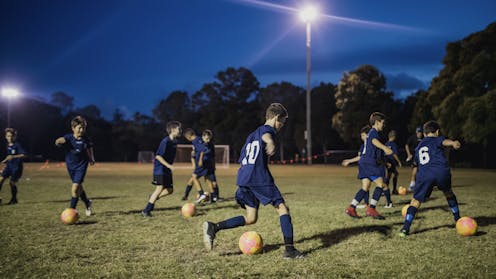New online gambling laws could deal a bad hand to NZ’s grassroots sports clubs
- Written by Blake Bennett, Senior Lecturer in Sport Coaching and Pedagogy, University of Auckland, Waipapa Taumata Rau

Every weekend, thousands of New Zealand children pull on team jerseys, play on well-kept fields, and benefit from the quiet dedication of volunteers. Few stop to think about where the money comes from for uniforms, buses or tournament fees.
For decades, a large slice of that funding has been drawn from gaming machine (“pokie”) revenue, redistributed into communities through grants. That pipeline is now in danger of being broken.
The government’s proposed Online Casino Gambling Bill – due for its second reading in parliament soon – would regulate and license up to 15 offshore casino operators in New Zealand. On the surface, this looks like common sense: rein in an unregulated online market, protect consumers and tax the industry.
But buried in the detail is a potentially serious unintended consequence: there is no requirement for licensed online casinos to return a share of their revenue to community funding.
For grassroots sports, already struggling with a volunteer crisis, this could be another blow.
Each year, around NZ$170 million flows from gaming machine profits back into communities. These grants are lifelines for sports clubs (as well as arts groups, community health initiatives and local charities). They don’t just buy jerseys, they keep clubs alive.
If online casinos are legalised without community return requirements, the fear is that gambling dollars will shift away from local pokie venues and into the pockets of offshore operators. Community organisations would then suffer.
Sports leaders have spoken out already. Chair of Cycling NZ Martin Snedden has called the proposal a “crazy move” that poses a “massive risk” to grassroots sport. Without those grants, he says, thousands of small volunteer-run organisations will struggle to survive.
Volunteers under pressure
The timing could hardly be worse for a volunteer sector that’s been under strain for years. Once thriving clubs are now struggling to recruit and retain people.
My research with volunteer coaches and administrators shows compliance demands are growing, from child safeguarding checks to health and safety paperwork, meaning fewer people are willing to take on such roles.
The rising cost of living means fewer families can afford club fees or take unpaid time to help. Reduced community funding will only exacerbate the problem.
Supporters of the Online Casino Gambling Bill point to its intended benefits: a safer, regulated gambling market that protects consumers, generates tax revenue and imposes strong rules on age limits and advertising, with hefty fines for non‑compliance.
They also highlight the government’s promise of $81 million to address gambling harm through treatment and prevention.
For generations, however, New Zealand has operated on a social contract: gambling is permitted on the condition that profits are partially reinvested in communities.
This isn’t to say the pokie system is ideal. A 2021 report released by Hāpai Te Hauora-Māori Public Health and others, “Ending community sector dependence on pokie funding”, described pokies as a harmful model that makes community organisations dependent on losses from the very people they’re trying to support.
Written in the wake of COVID’s disruption to gambling revenues, the report argued it was the ideal moment to shift to a fairer system, calling for the government to directly fund community and sport grant recipients.
The new bill, however, doesn’t resolve the bigger picture. It may reduce some consumer harms by bringing offshore casinos under regulation, but it does nothing to replace the community funding that will be lost.
Instead, it simply cuts community organisations out of the loop. The consequences will likely be felt widely:
clubs will fold or be forced to cut programs, and participation will shrink, especially in low-income areas where grants have been most crucial
wealthier communities may survive on fees and private sponsorships while poorer ones won’t, deepening inequality
with fewer resources, volunteers will face even greater pressure as they are expected to do more with less
and the social cohesion enhanced by community groups is undermined.
A consistent approach
The solution could be relatively simple, if politically inconvenient: apply the same community return principle to online casinos that already exists for pokies. That could mean:
requiring licensed online operators to contribute a fixed percentage of gross gambling revenue to a community trust
ring-fencing a portion of tax revenue for community funding (beyond gambling harm services)
establishing a transparent framework so communities can see and trust where the money goes.
Another option, raised in the Hāpai Te Hauora report, is for the government to move away from gambling reliance altogether and directly fund community and sports groups. The $170 million a year is hardly unmanageable, and it would signal a commitment to sustaining the volunteers and organisations that underpin community life.
These approaches would be consistent with New Zealand’s longstanding gambling policy principle: if governments allow gambling to expand, they must also support the communities that feel the downstream impact.
For parents watching their children play on Saturday mornings, for volunteers balancing spreadsheets late at night, and for already stretched communities, this is more than just another abstract policy debate.
Authors: Blake Bennett, Senior Lecturer in Sport Coaching and Pedagogy, University of Auckland, Waipapa Taumata Rau



















